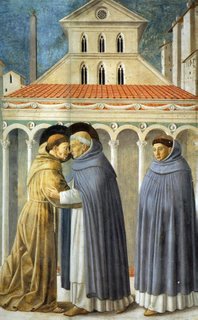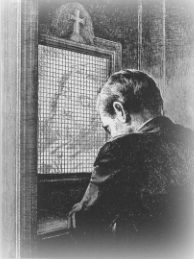 Greater Double (1955 Calendar): August 4
Greater Double (1955 Calendar): August 4Memorial (1969 Calendar): August 8
Today is the feastday of St. Dominic de Guzman, popularly known just as St. Dominic, the one that received the Rosary from Mary. Today is a wonderful day to learn why and how to pray the Rosary. St. Louis Marie Grignion de Montfort wrote: "The rosary is the most powerful weapon to touch the Heart of Jesus, Our Redeemer, who loves His Mother."
St. Dominic was born in 1175 in Castile, Spain, to the illustrious Guzman family to Blessed Joan of Aza and Felix Guzman. While pregnant, Blessed Joan of Aza dreamed that she would bear a son who would be a shining light to the Church. She also dreamed that she gave birth to a dog that broke away from her with a burning torch in its mouth by which it set fire to the world. This dog became a symbol of the Dominican order that St. Dominic would found in 1215. She also dreamed that her child had bright star on his head that enlightened the world.
At the age of seven, he went to study with his uncle, who was a priest. At the age of fourteen, St. Dominic enrolled in the University of Palencia. He began many years of studying for the priesthood. During his studies, St. Dominic immersed himself in the Holy Scriptures. And when Spain was ravaged by war and famine in 1195, he sold everything he owned to bring relief to the destitute.
St. Dominic was an Augustian and worked for clerical reform. By age 26, St. Dominic was fighting the Albigensian Heresy, which taught that there are two Gods, marriage is a sin, and denied the Trinity, incarnation and redemption. While many others had failed to stop the spread of the heresy, St. Dominic succeded. In 1208, St. Dominic knelt in the little chapel of Notre Dame de La Prouille and asked Mary, the Mother of God, to save the Church. She appeared to him with a Rosary and instructed him to pray the Rosary, teach it to all who would listen, and she said that the true faith would win out. It was during one of the famous battles in southern France against the Albigensians, when St. Dominic revived the courage of the Catholic armies to victory against overwhelming numbers; he had the Rosary in his hand the entire time.
In 1215, St. Dominic founded the Order of Preachers (Dominicans), a group of men that were to live a simple, austere life; he also created an order of nuns dedicated to the care of young girls. Soon afterwards, the Pope commissioned Dominic to establish a group of friars at the Church of St. Sixtus in Rome. By 1219, forthy men resided in the foundation in Rome.
By Lent, 1219, St. Dominic had persuaded forty-four sisters to unite in one community thankfully. St. Dominic along with three cardinals received the sisters' profession on Ash Wednesday. Tragically, during the ceremony, news reached a cardinal there that his nephew, Napoleon, had died after falling from his horse.
Dominic immediately had the corpse carried into the chapel, and celebrated Mass with the cardinals, nuns, and friars in attendance. When he finished the Mass, he stood over Napoleon's broken body and straightened his limbs. St. Dominic then blessed the corpse, and with hands raised to heaven, he shouted, "Napoleon, in the name of Our Lord Jesus Christ, arise." In the view of many reliable witnesses, the young man then arose. [Source: Mystics and Miracles by Bert Ghezzi, Loyola Press, Chicago, IL, 2002]
One of his religious daughters, Cecilia Cesarini, describes St. Dominic in the following way: "The Blessed Dominic was of medium height and of slight build. His countenance was beautiful, of fair complexion, with light auburn hair and beard and luminous eyes. A kind of radiance shone from his brow, inspiring love and reverence in all. Full of joy, he seemed ever ready to smile, unless moved to pity by the affliction of his neighbor. His hands were long and shapely; his voice strong, noble, and sonorous. He never was bald, and his corona was complete, sprinkled with a few white hairs."
 Legend says that St. Dominic received a vision of a beggar who, like Dominic, would do great things for the Faith. St. Dominic met this beggar the very next day. He embraced him and said, "You are my companion and must walk with me. If we hold together, no earthly power can withstand us." The beggar was Saint Francis of Assisi. (Above image: Vision of St. Dominic and Meeting of St. Francis and St. Dominic by Benozzo Gozzoli, 1452)
Legend says that St. Dominic received a vision of a beggar who, like Dominic, would do great things for the Faith. St. Dominic met this beggar the very next day. He embraced him and said, "You are my companion and must walk with me. If we hold together, no earthly power can withstand us." The beggar was Saint Francis of Assisi. (Above image: Vision of St. Dominic and Meeting of St. Francis and St. Dominic by Benozzo Gozzoli, 1452)St. Dominic reportedly brought four people back from the dead during his life. He died on August 4, 1221, at Bologna, Italy. St. Dominic is the patron saint of astronomers, scientists, the Philippines, and the Dominican Republic. His remains are in the Basilica of San Domenico.
Fausto Appetente Die:
The seventh centenary approaches of the day when that light of holiness, Dominic, passed from these miseries to the seat of the Blessed. We for long have been most interested in his clients, especially since We assumed the government of the Church of Bologna, which with the greater devotion preserves his remains. We, therefore, are pleased to be able from this Apostolic See to exhort the Christian people to celebrate the memory of such a great man. In this We not only consult Our own piety but fulfil a duty of gratitude towards the father and lawgiver and towards the distinguished Order he founded.
Encyclical of Pope Benedict XV promulgated on June 29, 1921.
Prayer:
O God, Who hast vouchsafed to make Thy Church illustrious by the merits and teaching of blessed Dominic, Thy Confessor: grant that, through his intercession, she may not be deprived of temporal help, and may ever advance in spiritual increase. Through our Lord.
Prayer Source: 1962 Roman Catholic Daily Missal
Image Source (1st image): St Dominic of Guzman by Claudio, Coello Spanish painter, Madrid school (b. 1642, Madrid, d. 1693, Madrid - Oil on canvas, 240 x 160 cm Museo del Prado, Madrid














